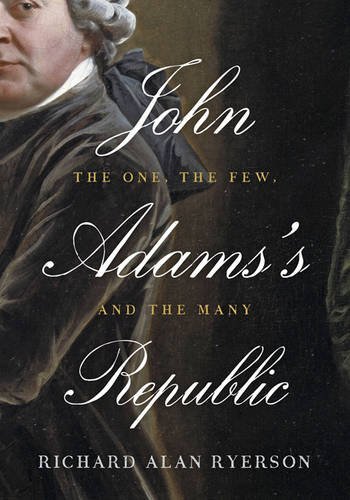John Adams’s Republic: The One, the Few, and the Many, by Richard Alan Ryerson (Baltimore, MD: Johns Hopkins University Press; 555 pp., $60.00). This very excellent and elegantly written book by the editor of the Adams Papers between 1983 and 2001 draws on the second American President’s entire corpus of political writing, from his books and pamphlets to his letters and diary entries. Adams was distrusted in his own time as an Anglophile sympathetic to aristocracy, or what we modern people call (after Pareto) “the elite”; today, his political thought is generally considered “irrelevant” both to the new American republic and to the United States in the 21st century. Ryerson shows that Adams, contrary to contemporary opinion, is extraordinarily relevant to both, perhaps more to the latter than to the former. John Adams believed in a stronger executive than the Constitution of 1787 allowed for, one endowed with, among other things, the single veto. The executive to him represented “the One.” He did not, as was commonplace even in his day, believe in universal suffrage, thinking rather that the vote should be the privilege of “the Many” as represented by a House of Representatives, or Delegates. As for “the Few,” the aristocracy (which meant to him, as to Jefferson, a natural aristocracy), Adams wished it to have a house of its own, the Senate—not for the purpose of allowing that body to increase and expand its power but as a means of quarantining it to preserve the “virtue” of the People’s House. Adams took from his long study of history the view that aristocracies are natural and inevitable in every human society, but that they are also uniquely dangerous to them, the chief interest and business of aristocracy being the acquisition of power and still more power. Though I don’t recall Ryerson’s noting the fact, Adams’s view in this respect turns on its head the historic assumption that the unique and necessary role of aristocracy is to resist and hold in check the power of the monarchy (“the One”), to protect not just its own rights but those of “the people” as well. However that may be, Ryerson argues that while Madison’s lasting contribution to American constitutional government was to secure “the Few” in their property and influence, Adams’s was to advocate a system that would be neutral in regard to class interest while encouraging peace and harmony over efficiency, growth, and what Ryerson calls “grandiose fantasies about the future.” Such a view, he acknowledges, had little appeal for an aspiring and expanding nation, even before 1861. From 1865 down to the present it had no appeal at all—until the beginning of the 21st century and the fervid concern about economic centralization and growing economic inequality following the financial crisis of 2008.
Flaubert, by Michel Winock, trans. by Nicholas Elliott (Cambridge, MA: Belknap Press/Harvard; 549 pp., $35.00). At the Sorbonne, Michel Winock wrote his dissertation on “Flaubert: Historian of His Time,” thus combining literature, his original field of study, and history, his new one. Winock emphasizes in a self-deprecating way that his biography is the work of an historian, not a literary specialist or critic, yet perhaps the book is all the better for that, biography belonging more properly to history than to artistic criticism. Whether that is so or not, Flaubert is a superior work: somewhat too detailed, perhaps, but not at the expense of its narrative drive nor its careful and compelling portrait of its subject, famous for having spent days perfecting a single sentence or paragraph whose rhetorical balance he frequently tested by shouting it out along the avenue of trees fronting his house at Croisset, on the banks of the Seine outside Paris. “Paradoxically,” Winock says, “by making the art of writing transcendent and placing it above everything that the modern world stood for, Flaubert became the most modern writer of his time.” Flaubert was not a reactionary, nor was he a monarchist, if only because he, like Balzac, realized that the French monarchy had been eclipsed in power and influence by the vulgar and ignorant bourgeoisie, and behind it the still more vulgar masses—the majority empowered by the extended suffrage. As the son of a well-known medical doctor in Rouen, Flaubert was himself a bourgeois, though Winock rightly says that to insist on the fact is to miss the point, since for him “the bourgeois was first and foremost the modern man, made stupid by utilitarianism, bloated with preconceptions, deserted by grace, and impervious to Beauty.” As early as his 20’s, Flaubert decided to withdraw from the world into solitude in order to devote his life to writing, unimpeded by every other responsibility and consideration including marriage, though he did have many affairs, including his relationship of many years with the poet Louise Colbert (from whom he was absent in one instance for an entire year, though Rouen and Paris were not far apart and she begged him to visit her there). Winock is excellent at providing the biographical and historical background for the novels, including Salammbô but especially L’Éducation sentimentale, set in Paris during the Revolution of 1848, which Flaubert observed at first hand with the skepticism and detachment of the apolitical artist, but with his painterly eye and his dramatic sense of individual experience and the human spectacle as well.
—Chilton Williamson, Jr.

Leave a Reply